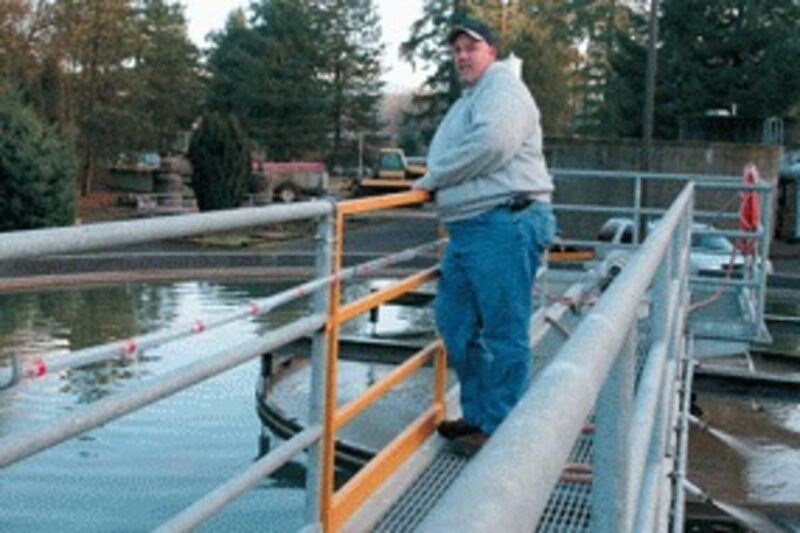Sean C. Morgan
Of The New Era
Operations Management International, Inc., took over management and operation of Sweet Home’s wastewater and water treatment plants on Dec. 1.
“The transition was very smooth,” said Doug Atkinson, Sweet Home operations manager. “There were very few problems, some of the minor things you can always expect.”
“There was a typical transition,” City Manager Craig Martin said, things like getting access codes and other information passed on to OMI.
Atkinson also was able to call on OMI resources to help with the transition, he said. Extra help and resources from elsewhere in the company are among the benefits to using OMI.
Sweet Home plant operators Bruce Gaskey and Tim Sanders continue to work in the Sweet Home plants.
They’re “part of the resources with people that were here,” Atkinson said. “They had a lot of knowledge of the process and where things were.”
Their overall experience was important too, Atkinson said. While incoming personnel understand plant operations in general, “you can’t just go into a plant” and know everything about it, where every little thing is or the quirks of a specific plant.
Atkinson is happy about how things are going, he said. “We’ve made the transition and been through a big rain storm and been through a big windstorm.”
Of the six plant employees working for the city of Sweet Home in the plants, two went to work for OMI, Martin said. OMI hired a third, but he went to work in Bend. Three transferred to the Public Works Maintenance Division.
Joining Atkinson, Gaskey and Sanders are David Jendro, who came to OMI from a vocational rehab background and Guy Davis from OMI’s Lebanon project.
Atkinson grew up in Springfield and “then when I started junior high we moved to Waldport,” he said. “So I am an Oregonian through and through.”
He graduated from high school in Waldport and spent 13 years in Alaska working as a plumber and pipe fitter.
In 1998, he decided to go to Linn-Benton Community College and entered the water-wastewater technical program.
“I was working a dead-end job at Home Depot is what I thought,” he said. With his background, he thought water-wastewater was a good fit.
“Little did I know it had nothing to do with that,” Atkinson said. OMI recruited him out of the program, and he went to work at Walla Walla, Wash., for five years. He then took an interim position in Twin Falls, Idaho, about 14 months long.
“I’ve made a circle,” he said, and now he’s back in Oregon.
He is 44 and single and moved to Sweet Home prior to the transition on Dec. 1.
“I live right in Sweet Home,” he said, but “it wasn’t like moving to a community I wasn’t familiar with.”
Prior to working for OMI, he lived in Albany and attended the Jamboree five or six times. His family was among the first to get a camping spot. His family still holds a camping space off 18th Avenue across the fence from the backstage area.
“Sweet Home’s changed a lot in the last five, six, almost seven years since I was here last,” Atkinson said. “It seems to be a little more progressive and alive than what it used to be.”
Growing up in Waldport, he is familiar with Sweet Home’s story, he said. Waldport suffered with the decline of the timber industry as well, when small-town economies became so depressed.
“It’s nice to see Sweet Home rebounding,” he said.
Atkinson is a golf fanatic, something he enjoyed at Twin Falls with its many inexpensive courses. He also is a Ducks fan and enjoys traveling in Central Oregon, where several relatives live.
Atkinson thinks living in the community, something raised during City Council discussions earlier this year about whether to contract with OMI, is important.
“When I moved to Walla Walla, I lived in Walla Walla,” he said. “When I moved to Twin Falls, I lived there. I think it’s important to do that, to support the local economy (plus, he lives three minutes from work). Everything we can buy supply-wise, we try to buy it locally.”
The rest of the crew also lives in the Sweet Home area, with just one living between Sweet Home and Lebanon.
“I’m just happy to be here,” Atkinson said. “I know for some people, it’s a transition that probably is a little difficult at times, but we are part of the community. We’re here to help not hinder.
“For the most part, everybody’s been friendly and very nice. So many times you come into this situation, it can be hostile. You never know what you’ll walk into when you do a startup.”
Headquartered in Greenwood Village, Colo., OMI was formed in 1980 as part of the CH2M Hill family of employee-owned companies. It was among the first businesses to offer the service of running publicly owned wastewater and water treatment plants, concentrating on small- to mid-sized facilities. Such “privatized” utility operations account for 80 percent of OMI’s annual revenues, which totaled about $147 million in 2000. OMI employs approximately 1,800 persons. CH2M Hill employs about 18,000.





